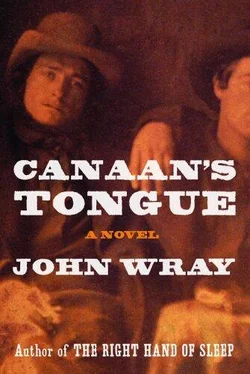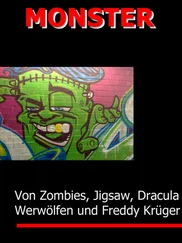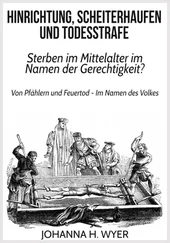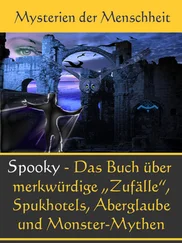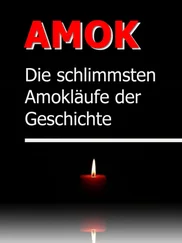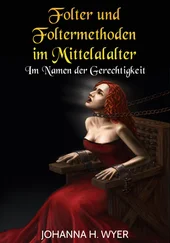The foyer was empty & dark & the Child lost no time in crossing it on the toes of his high-heeled boots. Just as we reached the stairs, however, the proprietorappear’d out of the gloom, moving with the unmistakable vigor of a man with money coming to him. “Ah! Mr. Myrell,” he said shrilly. “I didn’t supposethat you’d retired.”
The Child stopped, turn’d slowly about & worked his features into a smile. “I was about to, Mr. Costello. The crowd was a trick to turn tonight.”
“I see,” said the little man, pursing his lips. “And you, Mr. Kennedy? Will you be retiring, as well?”
“Mr. Kennedy has errands to run,” the Child put in before Kennedy could answer. “He’ll be sure not to disturb you when he comes in.”
“Oh! I wouldn’t object to being disturb’d so much,” the proprietor said, turning to me — of all people! — & smiling as if to a fellow sufferer. “Particularlyif he saw fit to settle his accounts.”
“Mr. Costello!” the Child said, making a queer clacking noise with his tongue. “Don’t I pay our room & board each week, as regular as church?”
“I was speaking of the bar accounts,” the proprietor said primly.
“I like your crust,” Kennedy growled, stepping around the Child. But the Child caught him deftly by the sleeve.
“We’ll have none of that, Stutter. Go & see to your errands.”
“I want to stay,” Kennedy said, fixing his blood-shot eyes on the proprietor.
“Stutter,” the Child said softly.
Kennedy glared at the little man a moment longer, shoved me aside with his elbow, & left the rooming-house without a word.
“You should be careful of that boy of mine, Mr. Costello,” the Child said, looking after Kennedy. “He has a temper.”
“So do I,” the proprietor said. “The bill is fifteen dollars.”
I could scarce believe my ears — fifteen dollars was a princely sum at that time. The Child batted his eyes at the proprietor, sniff’d indignantly at the air, then sigh’d & produced a roll of fresh-minted Treasury bills. I’d never seen half as many in one man’s hand. “Fifteen dollars to Mr. Costello,” the Child said, counting the notes out with great deliberateness.
The proprietor took the bills & inspected them closely, holding them up to the lamp — he’d obviously not expected to see a penny. When he was finish’d he gave a little snort of pleasure & turn’d to me. “And who is this young cavalier?”
“Good-night, Mr. Costello,” the Child said, turning his back on him & guiding me resolutely up the stairs.
Once the two of us were alone I found it harder than ever to contain my excitement. The idea that just that morning I’d been no more than idly curious about the man before me, that I’d known less about him than Wallace’s negroes did, was almost as incredible as the fact that I was about to enter his private chambers. That the grand suite I’d imagined proved, upon entering, to be a three-penny bedroom, its door held shut by a loop’d length of twine, did nothing to dispel my amazement. My thoughts were set on the coming interview. What questions might he put to me, how on God’s green earth would I reply? I imagined nothing short of having to give a complete moral & spiritualaccounting of my life.
“The Pharisee’s Suite,” the Child announced, kicking the door open with his foot.
The room we stepped into was lit by a single window set high in the wall, the kind more commonly found in cellars; by standing on tip-toe I was able to discover that it looked westward, over a jumble of shabby roofs & alleys, toward the better half of town. What scant light remain’d was swiftly draining from the sky, & the room was a tangle of contradictory shadows. I’d just turn’d back from the glass when the wall to my left seemed to fold over on itself; I let out a sharp cry & dashed for the door, nearly trampling the Child in my distress. The Child gave a laugh & caught me by the buckle of my belt.
“Goodman Harvey, hawker of tonics — our Parson. Parson: Harvey.”
“Parson. .?” I said, staring cow-eyed at the man who now emerged out of the dark, his face tipped sideways into a leer. After a mute, stricken pause, I shook the apparition’s hand; he was one more wonder in a night of wonders, nothing more. His hand was smooth & peculiarly elastic, like the pads on the foot of a pedigreed hound.
“Harvey is an enthusiast,” the Child said, leading me to a straight-backed chair in the middle of the room.
The apparition smiled.
I sat down in the chair as bidden. My companions remain’d standing.
“Tell us, Harvey,” the Child said, laying his palm ever-so-lightly on the back of my neck—“Which portion of our lecture did you find the most a fecting?”
I’d not been touch’d by anyone in ages. The warmth of his hand made my mouth go dry. “All of it, Preacher,” I murmur’d.
The Child gave a sour little snicker at this. “Did you hear what he call’d me just now, Auntie?”
Auntie? I look’d to every side. Was there a fourth person in the room?
Parson sucked in a breath, as though he’d only just awoken. “I heard,” he said.
The Child laugh’d again, more gently. “They ran me out of Louisiana on a railroad tie, Harvey, for giving myself that title.”
I squirm’d & fidgeted in my chair, desperate to make some sly rejoinder. The Child gazed wistfully at Parson; Parson’s queer gray eyes bored into me in a way that made my stomach twist.
“Those people back at the Old Grange thought of you as a preacher, sir,” I mumbled. “They believed every word you said. I’m sure of it.”
The Child gazed sleepily at the ceiling. “People believe things in this country, Harvey. Especially if you tell it to them from a well-lit box. Haven’t you learned that yet?”
“But surely they won’t believe just anything, sir,” I protested. “Not from anybody. I see no reason why—”
“Because they want to, Harvey. That’s all. They want to, & it’s enough.”
I nodded blankly, looking from the Child to Parson & back again. By some trick of the light it seem’d to be growing brighter in the room. The smoke of the candle crept up the wall behind Parson without the slightest flutter. The Child let his head sink down against his chest, seemingly forgetting me completely; Parson, for his part, neither spoke nor stirred. Seconds went by, then minutes. The silence grew excruciating. Was my interview at an end so soon? I refused to credit it.
Between the Child & myself stood a second chair, distinguish’d by a cushion of yellow silk — a veritable throne in that dilapidated room. I resolved to break the silence. “Won’t you be seated, Parson?” I inquired.
Parson’s eyes flew open & he straighten’d with a gasp, as though I’d poked him in the side, or broken wind. “You are a Mormon?” he demanded.
“I was, sir — yes,” I stammer’d, more astonish’d now than ever. No such information had pass’d between Parson & the Child.
The Child wink’d at me. “Our Parson can smell a believer a mile o f, if the wind is right. Can’t you, Auntie?”
“They smell like a tart’s monthlies,” Parson replied.
“Mr. Wallace told me far too little of your history, Mr. Harvey,” the Child said, sitting down in the chair himself. “What was it that caused you to drift into this godless country?”
Читать дальше
